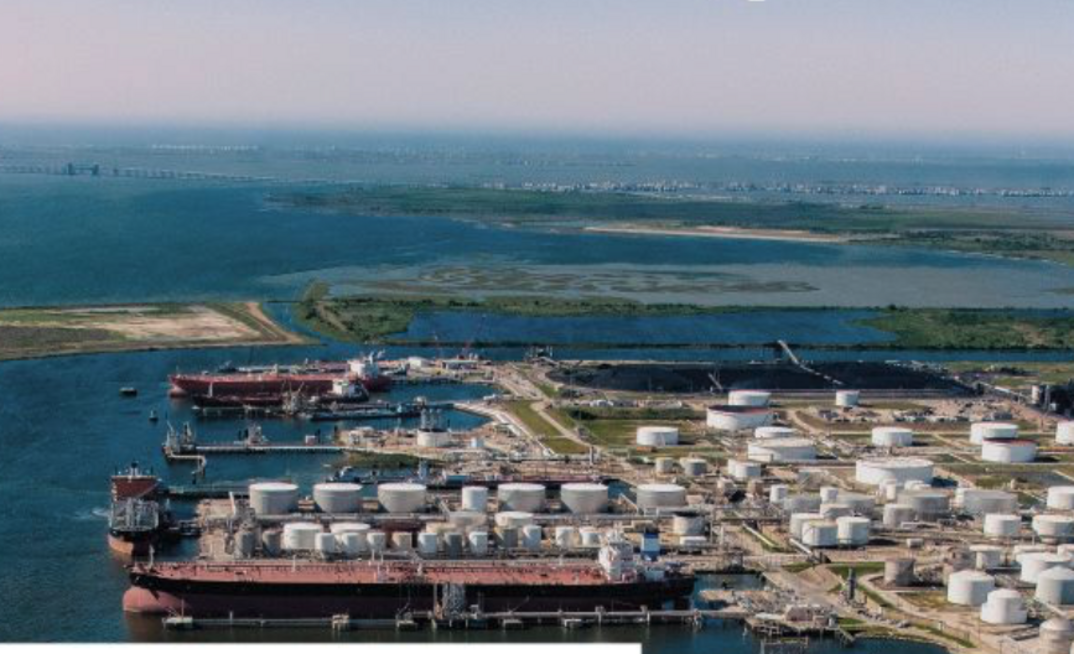
Exxon Mobil’s Landmark Acquisition for Offshore CO2 Capture: A Big Step Toward Carbon Reduction
Published by Todd Bush on October 14, 2024
In a notable development in the energy sector, Exxon Mobil Corp has secured a significant acquisition, leasing over 271,000 acres in Texas state waters for an offshore carbon dioxide (CO2) capture operation.
The move is a pivotal step in Exxon’s broader strategy to tackle climate change and reduce carbon emissions, aligning with the growing global demand for innovative carbon capture and storage (CCS) solutions.
With this acquisition, Exxon continues to solidify its role as a key player in the carbon reduction landscape.
>> RELATED: ExxonMobil Secures Largest CO2 Offshore Storage Site in the U.S.

Exxon Mobil’s Strategic Expansion in Carbon Capture
Exxon’s latest lease acquisition marks the company’s commitment to the long-term sustainability of the environment.
This deal with the Texas General Land Office comes on the heels of Exxon's successful 2021 bid for federal land off the Texas coast, where the company has focused on establishing itself as a leader in CO2 capture and storage technology.
In 2023, Exxon was also the highest bidder on 69 blocks in the shallow waters of the U.S. Gulf of Mexico.
This acquisition is designed to bolster Exxon’s carbon storage capacity, expanding its ability to store CO2 from industrial sources deep beneath the seabed.
This growth in potential carbon storage area positions Exxon to meet the increasing demands for carbon storage in both public and private sectors.
“With our growing roster of customers ready to deploy CCS (carbon capture and storage), we’ll be driving substantial emissions reductions along the Gulf Coast,” said Dan Ammann, president of ExxonMobil Low Carbon Solutions.
This statement highlights the company's ambition to significantly curb emissions and underscores the confidence it has in its CCS technology.
Carbon Capture: An Industry-Wide Effort
Exxon’s move is part of a broader trend among oil and gas giants investing heavily in carbon capture technology.
Companies like Chevron Corp and Occidental Petroleum Corp have also embraced CO2 capture as a key strategy to combat climate change.
These efforts are not just about environmental responsibility but also about securing a place in the future low-carbon economy.
Carbon capture and storage involve capturing CO2 produced by industrial activities and storing it underground to prevent it from entering the atmosphere.
This technology is considered essential for industries that are hard to decarbonize, such as manufacturing, oil, and gas.
Exxon’s involvement in expanding this technology, alongside other energy leaders like TotalEnergies, demonstrates the increasing momentum of CCS solutions.
“Carbon capture technology is not just about reducing emissions—it's about paving the way for a sustainable future,” added Ammann.
By tapping into these resources, Exxon and its peers are setting a foundation for the next generation of energy production and environmental stewardship.

>> In Other News: Hydrogen Technology Expo to Showcase Latest Innovations
Texas: A Prime Location for CO2 Storage
Texas has become a critical hub for carbon capture initiatives, largely due to its vast available land, established oil and gas infrastructure, and supportive state policies.
The Texas General Land Office has been instrumental in facilitating these initiatives, granting access to state lands that are ideal for CO2 storage due to their geological characteristics.
While the financial details of Exxon’s lease agreement remain undisclosed, the strategic importance of this acquisition is clear.
The 271,000 acres of Texas state waters represent an enormous opportunity for Exxon to expand its carbon capture operations and meet the increasing demand for CO2 storage capacity.
A spokesperson for Texas Land Commissioner, Dawn Buckingham, did not immediately respond to requests for further information regarding the lease terms, but the deal is expected to have a long-lasting impact on the region’s environmental goals.
Exxon Mobil: Leading the Charge in Low Carbon Solutions
ExxonMobil Low Carbon Solutions, a division specifically focused on reducing greenhouse gas emissions, has been driving the company’s efforts in carbon capture technology.
With the increasing urgency of climate change, Exxon has taken a forward-looking approach to diversify its business model and invest in low-carbon solutions.
The company’s interest in CCS is not new. In recent years, Exxon has been building its portfolio of carbon capture projects and collaborating with other major energy companies to push the envelope on sustainable practices.
This latest acquisition further cements the company’s role in leading the energy transition.
With its focus on expanding carbon storage capacity in Texas and the Gulf of Mexico, Exxon is positioning itself as a solution provider for industries looking to lower their carbon footprints.
This comes at a time when governmental policies and international agreements are pushing for stronger action on climate change, making carbon capture a key area of growth in the energy sector.
The Role of Chevron and Occidental in Carbon Capture
Chevron Corp and Occidental Petroleum Corp are also at the forefront of carbon capture technology, signaling a shift across the oil and gas industry toward reducing carbon emissions.
Both companies have recognized the potential of CO2 capture in addressing global emissions while ensuring continued energy production.
Chevron has been particularly vocal about its role in advancing carbon capture projects, while Occidental is known for its ambitious goal of becoming carbon-negative by 2040.
These companies' investment in CCS not only reflects an industry-wide shift but also helps reinforce public trust in their ability to adapt to new environmental challenges.
While Exxon, Chevron, and Occidental are each pursuing their own unique strategies, their collective efforts highlight the importance of industry collaboration in solving one of the world’s most pressing issues: climate change.
By working together, these energy giants are laying the groundwork for a future where carbon emissions can be significantly reduced, if not eliminated, from industrial processes.
A Look Ahead: The Future of Carbon Capture
The race toward sustainable energy is intensifying, and carbon capture technology is at the heart of it.
Exxon’s acquisition of Texas state waters for CO2 storage is a powerful reminder of how the energy landscape is shifting toward sustainability.
As more companies follow suit, the role of carbon capture will likely expand, offering a viable solution to help industries meet their climate goals.
Exxon’s forward-thinking investments in low-carbon solutions demonstrate its commitment to remaining a leader in the energy industry while helping to address global environmental challenges.
As the company continues to expand its carbon capture operations, it is likely that more innovations and advancements in the field will follow.
This is an exciting time for both the energy industry and the environment, as new technologies offer hope for a more sustainable future.
With major players like Exxon, Chevron, Occidental, and TotalEnergies investing heavily in carbon capture, the road to a low-carbon economy seems increasingly feasible.
The stakes are high, but the potential rewards—for both the environment and the companies involved—are even higher.
Subscribe to the newsletter
Daily decarbonization data and news delivered to your inbox
Follow the money flow of climate, technology, and energy investments to uncover new opportunities and jobs.
Companies
Latest issues
-
Three Industry Giants Just Aligned on Ammonia
Inside This Issue ⚓ CF Industries, Trafigura And TFG Marine Sign MOU To Advance Low-Carbon Ammonia For Maritime Decarbonisation 🌽 EPA Expects to Finalize 2026-27 Biofuel Blending Rules in Q1 2026 ...
-
What Drillers Hit 140km South of Saskatoon
Inside This Issue 🌱 Indigo to Sell 2.85 Million Tonnes of Carbon Removal to Microsoft, Supporting Soil Health Through Regenerative Agriculture 🏛️ Legislation Would Give Parishes Control Over Carbo...
-
This $475M Indiana Plant Turns Petcoke Into Clean Fuel
Inside This Issue 🏗️ This $475M Indiana Plant Turns Petcoke Into Clean Fuel 🏛️ Buckeye Gives Final Support to Rezone Nikola Property for Hydrogen Huba 🧪 CHARBONE Secures its First Order for Clean ...
Company Announcements
-
Ammobia Raises $7.5M To Scale Low-Cost Ammonia Production Technology Critical To Energy Resilience
Shell Ventures, Air Liquide, MOL Switch, and Chevron Technology Ventures back breakthrough poised to deliver 2x cost reduction for global ammonia producers SAN FRANCISCO, Jan. 14, 2026 (GLOBE NEWS...
-
Legislation Would Give Parishes Control Over Carbon Capture
(The Center Square) – Louisiana parishes would have a say in how carbon capture and sequestration projects are approved and developed in their jurisdictions under bills filed by Rep. Mike Johnson, ...
-
Alabama County Opposes Massive Carbon Pipeline Project
An aerial shot of timberland behind Wesley Laird's farm near Florala, Ala. Reliant Carbon Capture & Storage, a Colorado-based carbon capture firm, has proposed using 74,000 acres of timberland ...
-
Trafigura Signs Offtake Agreement for Advanced Sustainable Aviation Fuel Produced From Biogas
Geneva, 20 January 2026 – Trafigura Pte Ltd ("Trafigura"), a market leader in the global commodities industry, has signed a binding six-year offtake agreement with SP Developments Uruguay S.A. (“Sy...